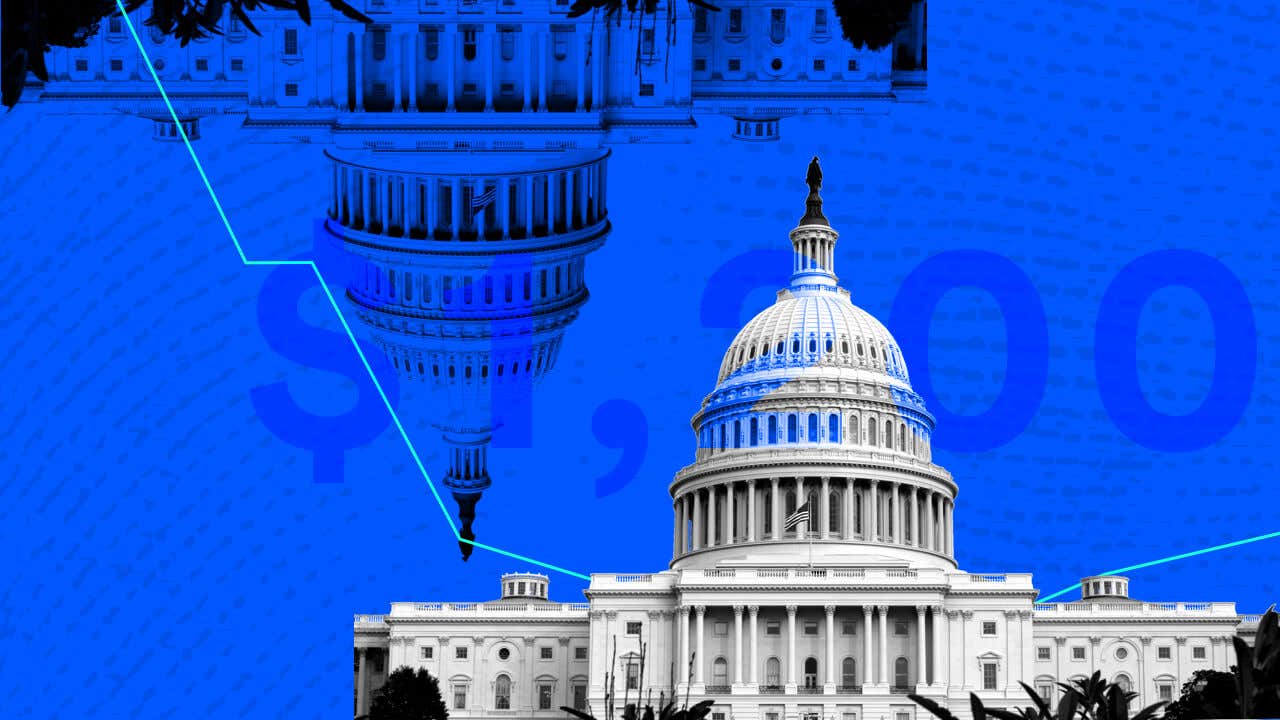Survey: 31% of Americans expecting a stimulus check say it won’t keep them going a month

The federal government’s relief checks will provide millions of Americans with much-needed support in light of the coronavirus shutdowns nationwide, but it won’t be enough to cure their financial hardship, a new survey from Bankrate finds.
The majority of Americans (or 67 percent) anticipate receiving a stimulus payment, thanks to the third fiscal care package President Donald Trump signed into law on March 27. But 31 percent of those expecting money say it won’t sustain their financial well-being for even a month, including 8 percent who say it won’t be enough to help them at all.
It comes on the heels of 10 million Americans applying for unemployment benefits in March alone, an unprecedented surge that’s overwhelmed many state employment offices as businesses close to slow the virus’ spread. Economists at the Federal Reserve Bank of St. Louis estimate joblessness could top 32 percent, which would have consequences for consumers’ wallets and the broader economy.
“This payment will not be a financial panacea, but it is sorely needed by millions,” says Greg McBride, CFA, Bankrate chief financial analyst. “For those already suffering from income disruptions, the payment will be needed for day-to-day essentials and monthly obligations.”
Bankrate surveyed 1,465 adults on how the fiscal stimulus checks would impact their personal finances. Here’s the survey’s key findings and what it means for you.
Key takeaways:
- Majority of respondents (67 percent) expect to receive a stimulus check, while 16 percent don’t and 17 percent aren’t sure if they will.
- 80 percent say stimulus money will be somewhat or very important to their financial well-being.
- 31 percent expect payments to sustain them for less than a month, and 64 percent say less than three months.
- Half of Americans plan to use checks for paying bills, while 8 percent plan to spend it on non-essential purchases.
Majority of Americans expecting a stimulus check
While the majority of Americans are expecting to receive a check, nearly 1 in 6 aren’t, and 17 percent don’t know, Bankrate’s survey found.
That’s because not everyone is eligible. Who receives a check and the amount is based on a person’s annual adjustable gross income (AGI), or someone’s earnings after top-line deductions. Individuals with incomes up to $75,000 will get the full relief check. Couples, meanwhile, will receive $2,400 as long as their combined adjusted gross income doesn’t top $150,000. Both individuals and couples are also eligible to receive an additional $500 payment per child under age 17.
Reduced checks will go out to individuals with incomes up to $99,000 and couples who don’t make more than $198,000, with the payment amount falling by $5 for every $100 over that threshold.
Stimulus checks important for Americans’ financial well-being
The Internal Revenue Service said Thursday it anticipates depositing the first round of checks later this week, at the earliest. Mailed checks, however, will start going out later this month — in some cases taking as long as five months to hit consumers’ mailboxes.
Bankrate’s survey suggests the sooner those checks go out, the better. Half of respondents said the checks will be very important, while 30 percent said it will be somewhat important to their financial situation in the near future. By comparison, only 5 percent said the checks wouldn’t be important.
Broken down by age group, the checks matter most to millennials and Generation Xers, with 55 percent of respondents in both age groups reporting that the checks would be very important. Nearly 4 in 10 (or 43 percent) of baby boomers reported the checks as having this same level of significance.
The payments also become more important for individuals in lower-income categories. Nearly 7 in 10 individuals (or 69 percent) who make under $30,000 a year said the stimulus money will be very important for their financial situation. That compares with 36 percent of those making $80,000 or more.
The checks will fill a much needed a hole in Americans’ wallets, one that existed long before the unexpected surge in unemployment. A separate Bankrate survey from January found that nearly 4 in 10 Americans didn’t have sufficient savings to cover a $1,000 emergency expense, with lower earners disproportionately less prepared than their counterparts with higher incomes.
Many Americans were also living paycheck-to-paycheck before the coronavirus crisis came along, with nearly 2 in 5 individuals reporting in October 2019 that they wouldn’t be ready for a downturn if it occurred in the next 12 to 18 months.
While checks are important, Americans don’t expect them to last very long
But the survey findings point to the likelihood of the stimulus payments not lasting for very long, a troubling sign for many Americans as stay-at-home orders in states such as Massachusetts and Delaware could last well into May, if not longer.
While 31 percent say the checks will sustain their financial well-being for less than a month, nearly a third (or 32 percent) expect that the money will last from one month to less than three months. Meanwhile, 11 percent expect the money to last for at least five months, with 7 percent of those individuals saying it’s possible the money could go for longer.
The higher the annual income, the less confidence a respondent has in how long the checks will prop up their finances. Four in 10 Americans making $80,000 or more a year say their stimulus checks won’t sustain their financial well-being for a full month. That compares with just 26 percent of those making less than $30,000.
Given that stimulus checks are reduced by $5 for every $100 an individual makes above $75,000, someone who makes $80,000, for example, would receive a $950 check. The money phases out entirely for individuals who make more than $99,000.
Meanwhile, the stimulus payments are likely seen as a more generous benefit to someone who makes under $30,000 annually, a salary that offers a biweekly paycheck well below $1,200.
Half of Americans say they’ll use checks for bills
When it comes to plans to use their cash from the federal government, most Americans say they are reserving it for the necessities.
Respondents reported a higher propensity to use the checks for monthly bills (50 percent) or day-to-day essentials such as food or supplies (41 percent) compared with other categories. Three in 10 (or 30 percent) expect to put it toward savings, and a quarter (or 25 percent) will use it to pay down debt.
At the same time, 7 percent of respondents expect to use the money for non-essential purchases, such as a retail purchase or concert ticket at a later date. Another 7 percent expect to invest it.
Broken down by income, individuals making between $50,000 and $79,999 were most likely to use their checks to boost savings. Although that’s considered a wise step among financial experts, it could potentially challenge the checks’ economic purpose. As consumer spending comes to a near-grinding halt in light of virus-related shutdowns, part of the economic justification of a direct cash payment is to have it be spent in some capacity, ultimately circulating back through the economy.
Millennials were more likely than any older generation to report either planning to save (34 percent), pay down debt (28 percent), purchase a discretionary item (15 percent) or invest (11 percent) the money they receive from the federal government, though the majority (or 51 percent) reportedly plan to put it toward monthly bills.
What this means for you
Americans just weeks ago were living through the longest economic expansion on record. That all looks derailed at this point.
If you’re one of the millions of Americans who’s faced unexpected job loss, experts recommend cutting back on your expenses and utilizing whatever savings you have until your stimulus check arrives. After you receive your money, prioritize paying your bills and essential living expenses. Then, consider putting it toward your emergency cash cushion and paying off your high-cost debt, if you have any, says Corbin Blackwell, CFP, a financial planner at Betterment.
“With people having this lump sum coming in, this stimulus infusion could help you jump start that fund,” Blackwell says. “Paying down some of that high-cost debt is the next place we would look. Getting rid of your debt faster is going to lower your expenses.”
Unemployment benefits can also be an important income supplement to help get you by, and given the recent expansions to the program, many Americans may find it more generous and longer-lasting than one check alone. Meanwhile, several mortgage lenders and banks are offering relief to customers financially impacted by the virus.
Even if you are still employed, it’s wise to continue padding the emergency savings, given the overall shakiness of the economic outlook. Other recession-proofing tips include paying down debt and considering enriching activities that can broaden your skill sets.
“Even for folks who are a little uncertain but haven’t lost their jobs, they might want to beef up their checking account for three to five weeks, maybe two months, depending on how conservative or uncertain they feel,” Blackwell says.
But broadly speaking, the U.S. economy was sacrificed to help curb the spread of the virus — something that likely has more long-term benefits than consequences. Researchers at the University of Chicago estimate that social distancing efforts could save a total of $8 trillion in mortality costs.
It’s likely that a recession has already begun due to these efforts, with the hope that activity will rebound once the virus subsides. The only problem is no one knows when that point will be.
“This is a situation where people are being asked to step back from economic activity,” said Fed Chair Jerome Powell in a March 26 interview on NBC’s “Today” show. “In principle, if we get the virus threat under control fairly quickly, economic activity can resume.”
Methodology
Bankrate.com commissioned YouGov Plc to conduct the survey. All figures, unless otherwise stated, are from YouGov Plc. Total sample size was 1,465 adults, including 994 who anticipate receiving a stimulus check as part of the CARES Act. Fieldwork was undertaken March 30-31, 2020. The survey was carried out online and meets rigorous quality standards. It employed a non-probability-based sample using both quotas upfront during collection and then a weighting scheme on the back end designed and proven to provide nationally representative results.
Why we ask for feedback Your feedback helps us improve our content and services. It takes less than a minute to complete.
Your responses are anonymous and will only be used for improving our website.






